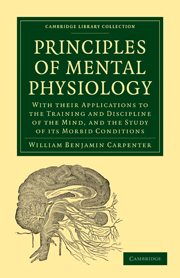 Principles of Mental Physiology
Principles of Mental Physiology Book contents
- Frontmatter
- PREFACE
- Contents
- BOOK I GENERAL PHYSIOLOGY
- BOOK II SPECIAL PHYSIOLOGY
- CHAPTER X OF MEMORY
- CHAPTER XI OF COMMON SENSE
- CHAPTER XII OF IMAGINATION
- CHAPTER XIII OF UNCONSCIOUS CEREBRATION
- CHAPTER XIV OF REVERIE AND ABSTRACTION:—ELECTRO-BIOLOGY
- CHAPTER XV OF SLEEP, DREAMING, AND SOMNAMBULISM
- CHAPTER XVI OF MESMEBISM AND SPIRITUALISM
- CHAPTER XVII OF INTOXICATION AND DELIRIUM
- CHAPTER XVIII OF INSANITY
- CHAPTER XIX INFLUENCE OF MENTAL STATES ON THE ORGANIC FUNCTIONS
- CHAPTER XX OF MIND AND WILL IN NATURE
- APPENDIX. DR. FERRIER'S EXPERIMENTAL RESEARCHES ON THE BRAIN
- INDEX
CHAPTER XIII - OF UNCONSCIOUS CEREBRATION
Published online by Cambridge University Press: 29 August 2010
- Frontmatter
- PREFACE
- Contents
- BOOK I GENERAL PHYSIOLOGY
- BOOK II SPECIAL PHYSIOLOGY
- CHAPTER X OF MEMORY
- CHAPTER XI OF COMMON SENSE
- CHAPTER XII OF IMAGINATION
- CHAPTER XIII OF UNCONSCIOUS CEREBRATION
- CHAPTER XIV OF REVERIE AND ABSTRACTION:—ELECTRO-BIOLOGY
- CHAPTER XV OF SLEEP, DREAMING, AND SOMNAMBULISM
- CHAPTER XVI OF MESMEBISM AND SPIRITUALISM
- CHAPTER XVII OF INTOXICATION AND DELIRIUM
- CHAPTER XVIII OF INSANITY
- CHAPTER XIX INFLUENCE OF MENTAL STATES ON THE ORGANIC FUNCTIONS
- CHAPTER XX OF MIND AND WILL IN NATURE
- APPENDIX. DR. FERRIER'S EXPERIMENTAL RESEARCHES ON THE BRAIN
- INDEX
Summary
416. Having thus found, reason to conclude that a large part of our Intellectual activity—whether it consist in Seasoning processes, or in the exercise of the Imagination—is essentially automatic, and may be described in Physiological language as the reflex action of the Cerebrum, we have next to consider whether this action may not take place unconsciously. To affirm that the Cerebrum may act upon impressions transmitted to it, and may elaborate Intellectual results, such as we might have attained by the intentional direction of our minds to the subject, without any consciousness on our own parts, is held by many Metaphysicians, more especially in Britain, to be an altogether untenable and even a most objectionable doctrine. But this affirmation is only the Physiological expression of a doctrine which has been current among the Metaphysicians of Germany, from the time of Leibnitz to the present date, and which was systematically expounded by Sir William Hamilton,—that the Mind may undergo modifications, sometimes of very considerable importance, without being itself conscious of the process, until its results present themselves to the consciousness, in the new ideas, or new combinations of ideas, which the process has evolved. This “Unconscious Cerebration,” or “Latent Mental modification,” is the precise parallel, in the higher sphere of Cerebral or Mental activity, to the movements of our limbs, and to the direction of those movements through our visual sense, which we put in train volitionally when we set out on some habitually-repeated walk, but which then proceed not only automatically, but unconsciously, so long as our attention continues to be uninterruptedly diverted from them.
- Type
- Chapter
- Information
- Principles of Mental PhysiologyWith their Applications to the Training and Discipline of the Mind, and the Study of its Morbid Conditions, pp. 515 - 543Publisher: Cambridge University PressPrint publication year: 2009First published in: 1874
- 1
- Cited by


